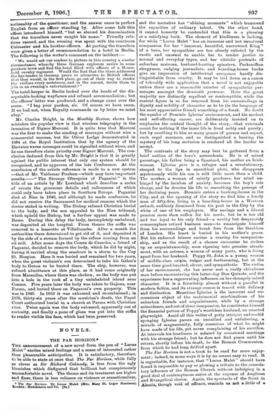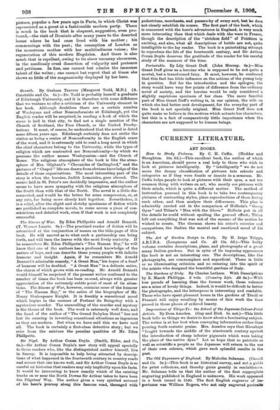NOVELS.
THE PAR HORIZON"
THE announcement of a new novel from the pen of "Lucas Maid" excites mixed feelings and a sense of interested rather than pleasurable anticipation. It is satisfactory, therefore, to be able to state at once that The Far Horiscra, while fully as clever as Sir Richard Calmady, is free from the ugly blemishes which disfigured that brilliant but conspicuously tmcomfortable novel. The theme and its treatment are higher and finer, there is less reliance on violence or sensationalism, Tho For Horizon. By Lucas Malet (Mrs. ii/M7 Bt. Leger Harrison). London: Hutchinson and Co. Ds.] and the narrative has "shining moments" which transcend the capacities of ordinary talent. On the other hand, it cannot honestly be contended that this is a pleasing or a satisfying book. The element of kindliness is lacking, for while "Lucas Malet " has an immense and not unnatural compassion for her "innocent beautiful, uncrowned King" of a hero, her sympathies are too closely enlisted by the exotic and unusual to enable her to render justice to normal and everyday types, and her vitriolic portraits of suburban matrons, husband-hunting spinsters, Pecksniffian clergymen, cadging journalists, and boarding-house bucks give an impression of intellectual arrogance hardly dis- tinguishable from cruelty. It may be laid down as a canon of tolerably wide application that a novel is not enjoyable unless there are a reasonable number of sympathetic per- sonages amongst the dramatis personae. Here the great majority are distinctly repellent or contemptible, while the central figure is so far removed from his surroundings in dignity and nobility of character as to be (in the language of his most appreciative friend) something of a freak. No doubt the squalor of Dominic Iglesias' environment, and his modest and self-effacing career, are deliberately insisted on to emphasise the central thought of the story,—that externals count for nothing if the inner life is lived nobly and purely ; but by ascribing to him so many graces of person and aspect, such regal manners, and so distinguished a bearing the mystery of his long seclusion is rendered all the harder to accept.
The contrasts of the story may best be gathered from a brief outline of the hero's antecedents. He is of mixed parentage, his father being a Spaniard, his mother an Irish- woman. Iglesias *re is a refugee and a revolutionary, steeped to the lips in anarchical plots, who disappears mysteriously while his son is still little more than a child. The mother, a woman of saintly goodness, her mind un- hinged by the incubus of anxiety, becomes the boy's sole charge, and be devotes his life to smoothing the passage of her declining years. Dominic enters a banking-house in the City, and at the opening of the story we find him a lonely man of fifty-five, living in a boarding-house in a Western suburb, suddenly dismissed from his post in the City by the whim of one of his employers. His savings and a liberal pension more than suffice for his needs, but he is too old and too loyal to his only friend—a worthy but desperately commonplace retired business man—to emancipate himself from his surroundings and break free from the thraldom of London. His heart is buried in his mother's grave. But his enforced leisure excites a craving for companion- ship, and as the result of a chance encounter he strikes up an acquaintanceship, soon ripening into genuine attach- ment, with an actress, a woman of many paste, who is living apart from her husband. Poppy St. John is a young woman of middle-class origin, vulgar and forthcoming, but at the same time good-hearted, clever, and sympathetic. The victim of her environment, she has never met a really chivalrous man before encountering this latter-day Don Quixote, and the experience has a regenerating influence on her strangely mixed character. It is a friendship almost without a parallel in modern fiction, and its strange course is traced with delicacy and distinction. Meantime Iglesias is the innocent and un- conscious object of the matrimonial machinations of his suburban friends and acquaintances, while by a strange coincidence, and out of sheer compassion, he constitutes himself the financial patron of Poppy's worthless husband, an unacted playwright. Amid all this welter of petty intrigue and sordid sponging Iglesias passes on unsullied and unfaltering, a miracle of magnanimity, fully conscious of what he might have made of his life, yet never complaining of his sacrifice. At intervals his loneliness is solaced by occasional meetings with his strange friend; but he does not find peace until his return, shortly before his death, to the Roman Communion. from which he had long drifted apart.
The Far Horizon is not a book to be read for mere enjoy- ment; indeed, in some ways it is by no means easy to read. It is regrettable, for instance, that "Lucas /islet" should have found it impossible to pay so glowing a tribute to the consola- tory influence of the Roman Church without indulging in a good deal of contemptuous satire at the expense of Anglican and Evangelical clerics. Again, the spectacle of the Saint in Alsatia, though void of offence, reminds us not a little of a picture, popular a few years ago in Paris, in which Christ was represented as a guest at a fashionable modern party. There is much in the book that is eloquent, suggestive, even pro- found,—the visit of Dominic after many years to the deserted house where he had ones lived with his mother ; his oommunings with the past; the conception of London as the monstrous mother with her multitudinous voices ; the regeneration of this modern Magdalen. And there is also much that is repellent, owing to its sheer uncanny cleverness, in the needlessly cruel dissection of vulgarity and pretence and pettiness. In fine, one cannot but admire the immense talent of the writer ; one cannot but regret that at times she shows so little of the magnanimity displayed by her hero.



























































 Previous page
Previous page